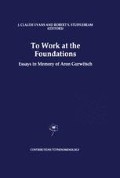Abstract
From the time his phenomenological method was fully developed, Husserl always distinguished between transcendental subjectivity and its empirical or “mundane” counterpart. In this, as in many other things, Husserl’s work was influenced by Kant and the neo-Kantians, who made a similar distinction. In this paper I want to examine this distinction, primarily in its Husserlian form, and consider some of its implications.
Access this chapter
Tax calculation will be finalised at checkout
Purchases are for personal use only
Preview
Unable to display preview. Download preview PDF.
References
See Alfred Schutz, The Phenomenology of the Social World, G. Walsh & F. Lehnert (Trans.s) (Evanston: Northwestern University Press, 1967, p. 97); also Collected Papers II: Studies in Social Reality, A. Broderson (Ed.) (The Hague: Martinus Nijhoff, 1964, p. 25).
Habermas, J., The Philosophical Discourse of Modernity, F. Lawrence (Trans.) (Cambridge: The MIT Press, 1987) passim.
Habermas, The Philosophical Discourse of Modernity, pp. 152, 178f.
(New York: Oxford University Press, 1986). See p. 62n.
A. MacIntyre, “Relativism, Power and Philosophy” in After Philosophy, K. Baynes, J. Bohman & T. McCarthy (Eds.) (Cambridge: The MIT Press, 1987, p. 385).
Ideas Pertaining to a Pure Phenomenology and Phenomenological Philosophy.First Book., F. Kersten (Trans.) (The Hague: Martinus Nijhoff, 1982, p. 133).
Cartesian Meditations, D. Cairns (Trans.) (The Hague: Martinus Nijhoff, 1960, p. 66f).
The Crisis of European Sciences and Transcendental Phenomenology, D. Carr (Trans.) (Evanston: Northwestern University Press, 1970, p. 178f).
The Crisis of European Sciences and Transcendental Phenomenology, p.
Phenomenology of Perception, C. Smith (Trans.) (New York: Humanities Press, 1962, p. xii.
Logical Investigations, Vol. II, J. N. Findlay (Trans.) (New York: Humanities Press, 1970, p. 549).
Fink, E., Studien zur Phänomenologie 1930–1939 (Den Haag: Martinus Nijhoff, 1966, p. 122). “The Phenomenological Philosophy of Edmund Husserl and Contemporary Criticism,” R. O. Elveton (Trans.). In The Phenomenology of Husserl: Selected Critical Readings,” R. O. Elveton (Ed.) (Chicago, IL: Quadrangle Books, 1970, pp. 73–147).
Carr, D., “Kant, Husserl and the Non-Empirical Ego,” Journal of Philosophy Vol. 74, 11, 1977.
Ideas Pertaining to a Pure Phenomenology and to a Phenomenological Philosophy. Second Book. R. Rojcewicz and A. Schuwer (Trans.) (Dordrecht: Kluwer Academic Publishers, 1989, p. 189f).
Nagel, op. cit. p. 51f.
Formal and Transcendental Logic, D. Cairns (Trans.) (The Hague: Martinus Nijhoff, 1969, p. 272f).
Ideen II, p. 180.
Ideas I, p. 58.
Fink, op. cit. pp. 110f.
J. P. Sartre, The Transcendence of the Ego, F. Williams & R. Kirkpatrick (Trans.s) (New York: Farrar, Straus & Co. 1957, p. 102f).
Nagel, op. cit. p. 10f.
The Crisis, p. 100.
For a strong version of this interpretation of Husserl see G. Funke, Phänomenologie: Metaphysik oder Methode?, 3rd ed. (Bonn: Bouvier Verlag Herbert Grundmann, 1979).
Speech and Phenomena, p. 4.
Logical Investigations, Vol. I, p. 88.
Author information
Authors and Affiliations
Editor information
Editors and Affiliations
Rights and permissions
Copyright information
© 1997 Springer Science+Business Media Dordrecht
About this chapter
Cite this chapter
Carr, D. (1997). On the Difference Between Transcendental and Empirical Subjectivity. In: Evans, J.C., Stufflebeam, R.S. (eds) To Work at the Foundations. Contributions to Phenomenology, vol 25. Springer, Dordrecht. https://doi.org/10.1007/978-94-011-5436-9_8
Download citation
DOI: https://doi.org/10.1007/978-94-011-5436-9_8
Publisher Name: Springer, Dordrecht
Print ISBN: 978-94-010-6287-9
Online ISBN: 978-94-011-5436-9
eBook Packages: Springer Book Archive

